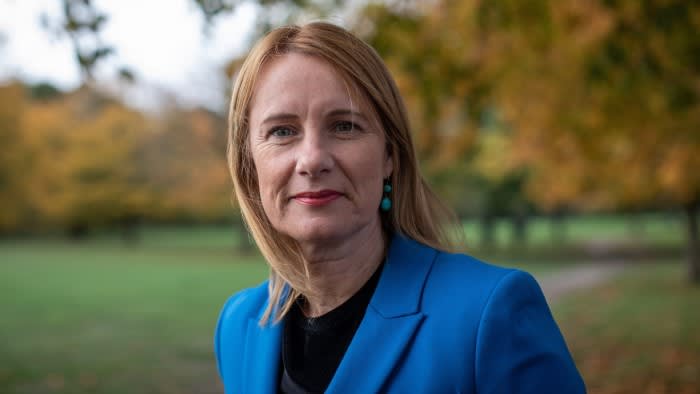Unlock the Editor’s Digest for free
Roula Khalaf, Editor of the FT, selects her favourite stories in this weekly newsletter.
The head of a leading cancer charity has urged the government to speed up the introduction of legislation designed to phase out smoking in the UK, saying further delay could cast doubt on the commitment to shift the NHS to a more preventive health system.
Ministers are still considering extending UK smoking restrictions to outdoor areas including pub gardens and children’s playgrounds as part of the tobacco and vapes bill, promised by the government in July’s King’s Speech. The bill, which campaigners hope will be published within weeks, was first announced by the previous government in November 2023.
The legislation will include outlawing the sale of cigarettes for children born on or after January 1 2009, and will impose limits on the sale and marketing of vapes.
In an interview with the Financial Times, Michelle Mitchell, chief executive of Cancer Research UK, said: “It’s essential that the tobacco and vapes bill is introduced immediately, and it must be done without further delay.”
Smoking remains the leading cause of cancer and is responsible for about 160 new cases across the UK every day, Mitchell said.
Ahead of this month’s Budget, Mitchell also called on the government to take action to ensure there is “sustainable and sufficient” funding for smoking cessation services across the UK.
Last October, the previous Tory government announced an additional £70mn per year to support local authority-led stop smoking services, more than doubling spending to a total of £138mn.
“Without these measures, doubts are being raised about how seriously Labour is committed to shifting to a more preventive health system,” she said.
The campaign group Action on Smoking and Health, estimates that the treatment of smoking-related illness costs the NHS approximately £1.9bn every year in England. Meanwhile, the Office for Budget Responsibility, the fiscal watchdog, estimates that in 2024-25, tobacco duties will raise £8.8bn in tax revenue for the government.
Mitchell is one of a number of health figures calling on ministers to consider introducing a levy on tobacco company profits, in addition to the tobacco duty paid by consumers, which she said would “make the industry pay for the damage it does to people’s lives, to our economy and to the NHS”. The four largest tobacco manufacturers make about £900mn in profits in the UK each year.
Such a levy would need to apply to all products that contain tobacco, she said, to avoid widening health inequalities. Past increases to the price of cigarettes have caused some smokers in lower socio-economic groups to switch to rolling tobacco, which is cheaper but carries a higher risk of cancer because people often smoke it without using a filter.
The Department of Health and Social Care said: “Smoking claims 80,000 lives a year, puts huge pressure on our NHS, and costs taxpayers billions. We are determined to protect children and non-smokers from the harms of second-hand smoking. We’re considering a range of measures to finally make Britain smoke-free.”


